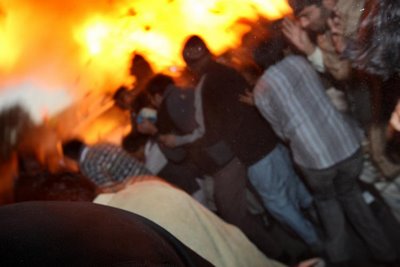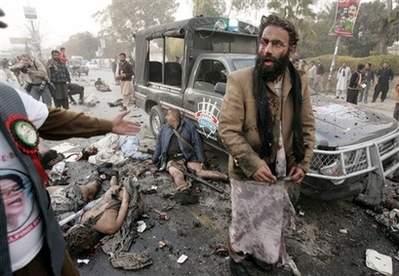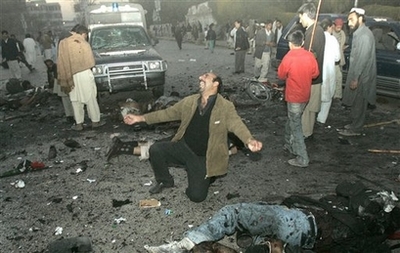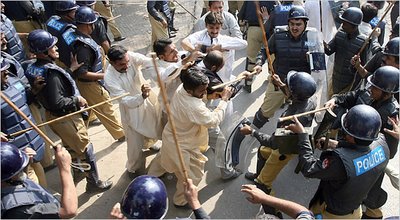A multiple tragedy, and potentially multiple deaths.


The assassination of Benazir Bhutto is a multiple tragedy. On one level, it continues the personal family tradition of "martyrdom": her father, Zulfikar Ali, was both president and prime minister of Pakistan before he was executed in 1979, ostensibly on charges of conspiracy to murder, but seen more as politically motivated following one of a number of military coups in Pakistan's short independent history, led by Zia-ul-Haq. Haq himself died in a plane crash in 1988. While it is by no means an exact comparison, the Bhutto clan most closely resembles the Kennedys: they both offered and offer the least worst political ideology in their respective countries.
For all of Bhutto's failings, and she had many, varying from the allegations of corruption and murder to the established fact that she was complicit in the military intelligence funding of the Taliban, her return to Pakistan less than three months ago was still welcome. In the face of the blatant gerrymandering of the vote under Musharraf, she at the very least gave hope to her supporters that her presence would stop the military dictator from stealing yet another vote. While his announcement of a state of emergency removed even that, with the supreme court judges who had struck down his reelection as president purged and replaced with obsequious sycophants who overruled the original decision, the longest striptease in political history finally came to an end when Musharraf was forced to shed his army uniform, standing down as its head. Even though the suicide attacks that had increased exponentially since the siege of the Red Mosque and bin Laden's call for jihad against the army and government that helped justify the state of emergency had continued unabated, there was a still a chance that the parliamentary elections, set for early next month, would be somewhat free and fair.
Bhutto's murder has almost certainly destroyed any lingering possibility of that. Although it seems highly unlikely that Musharraf, his supporters or the army were involved in the shooting followed by suicide bombing, he has the most to gain. For all the talk from both Bush and Brown today of not letting terrorism destroy democracy, neither will find much to complain about should Musharraf reinstate the emergency or even declare martial law. Postponement of the elections, possibly permanently, is doubtlessly also on the agenda. It's therefore completely understandable why the initial anger, rather than being directed towards the radical Islamists that had previously so ruthlessly attacked Bhutto's vanity on the homecoming parade and took 140 lives with them in the process, is currently being directed the president's way. The rioting that is being reported in Karachi and in some other areas will gradually turn from reaction to mourning, but not before it too is used as justification for another twist in Pakistan's tortured recent history.
If not Musharraf then, who is most likely responsible? Suspicion will instantly turn towards either al-Qaida itself or the Taliban, who had threatened to assassinate Bhutto and who nearly succeeded previously. The other chief suspects will be independent but al-Qaida inspired militants who declared war after the siege of the Red Mosque, or possibly remnants of other Pakistani terrorist groups formerly more concerned with Kashmir but now also increasingly focused on events in their home country itself. If it is the work of al-Qaida, then it will be the first high profile assassination that they have successfully achieved: while Ayman al-Zahawiri's former organisation al-Jihad aka Islamic Jihad had attempted to kill the Egyptian president Hosni Mubarak and there have also been previous attempts on Musharraf himself which have only been narrowly thwarted and afterwards linked to al-Qaida, their style has usually been to slaughter innocents, not specifically target politicians. Ramzi Yousef's plans to kill either Bill Clinton or the Pope were not strictly ever the work of al-Qaida itself, despite his involvement with Khalid Sheikh Mohammed: he was probably the closest takfirist terrorism has come to someone who just liked making bombs and killing people rather than caring about the religious motive, however spurious, behind it.
The rather hysterical claims that Pakistan now faces civil war or at the least the possibility of it are for the moment premature. The government has never really controlled the semi-autonomous, tribal regions of the east next to the Afghanistan border, and it's there that the real battle against those supportive of the Taliban will be decided, not in the cities, despite the suicide bombings which have mostly so far targeted either soldiers or military installations. What Bhutto's assassination has done is thrown even the semblance of normality in the country completely out of the window; how Musharraf responds will be crucial. A temporary harsh crackdown is likely unavoidable, and with the one remaining popular opposition leader Nawaz Sharif declaring he will boycott the elections, there's little reason for him not to go even further and once again rule by decree, again possibly for as long as the West tolerates it.
Whoever was behind the attack, when they murdered Bhutto they were also attempting to kill an idea, an ideology, even hope itself. However the people and the government of Pakistan reacts to this latest atrocity, they should not lose sight of Bhutto's own dream of a secular, peaceful and democratic Pakistan, even if her own flaws and lust for power of that imaginary nation should have disqualified her from leading it. From even the most dreadful and despicable of acts, good can still be drawn. Mourn now and fight for that ambition another day.
Labels: al-Qaida, assassinations, Benazir Bhutto, General Musharraf, Nawaz Sharif, Pakistan, Taliban, terror, terrorism



